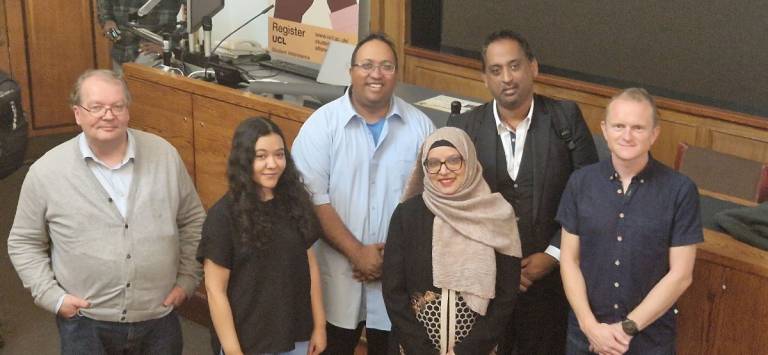UCL hackathon: how AI can assist in a humanitarian crisis
2 February 2024
Announcing the winners of the hackathon, which centred on the International Federation of Red Cross and Red Crescent Societies (IFRC), the world’s largest humanitarian aid organisation.

UCL Computer Science ran the interdisciplinary design hack ‘First Response in a Box’ at the start of the academic year. The hackathon tasked students with investigating how existing offline and online AI models could be used to help in emergency situations.
Professors Dean Mohamedally and Graham Roberts set the scene. They encouraged the students to work collaboratively and apply cutting-edge research to change the world, to solve serious problems and have fun at the same time.
Next, Luke Caley showed how the IFRC’s Go platform makes disaster information accessible. This data informs crucial decision-making, enabling the correct help to reach the field as quickly as possible.
Dr Shankar Sridharan of Great Ormond Street Hospital (GOSH) presented on the role of digital healthcare.
Professor Husna Ahmad OBE is the CEO of the Alliance of NGOs and CSOs for South-South Cooperation [ANCSSC], which collaborates with the United Nations Office for South-South Cooperation (UNOSSC). Professor Ahmad is also an Honorary Professor in Practice at UCL Computer Science. She spoke about how technology can drive progress towards the UN’s Sustainable Development Goals.
The speeches were followed by a workshop which focused on the technical aspects of how AI can support people impacted by disasters. The workshop included some of UCL Computer Science’s industry partners: Microsoft, IBM, NTT DATA and Intel.
At the end of the week, students submitted a short pitch video demonstrating how AI technologies could be applied in global crisis scenarios. As well as being a lively competition, the hackathon was a chance to meet others across UCL, learn collaborative working tools and gain insight into the transformative power of computer systems.

The winners
Choosing a winner from the impressive entries was difficult, but first place went to SecureEscape. The team’s idea was for an AI-based solution to help people evacuate areas affected by wildfires. Congratulations to Maya Ashkenazi, Nathan Carey, Sara Karati, Chloé Hashimoto-Cullen, Ilia Bachrach and Björn Kischelewski.
In second place was PriorityEye, who proposed using AI with drones in a search area. Well done to Dongjie Li, Qinyang Gong, Yuhan Shi, Anna Weir, Xingyou Pu, David Chong, Yagmur Ozdemir, An-tien Huang, Sreekar Cango and Oluwaseun Oluwafemi Ayegbusi.
Third place winners were AISOS: Vikkash Sureshkumar, Adwit Hans, David Frischer, Jennifer Zhang, Maulik Tripathi and Salman Azhan. Their concept was for a chatbot that provides a lifeline in emergencies, offering health advice and directions to nearby resources.
The runner up was Lifeline. Daren Palmer, Mohamed Mohamed, Yusuf Afifi, Kostas, Arnau Flotats, Jash, and Ediz Cinbas suggested a chatbot supplying medical guidance and signposting to care and refuge.
Our partners
Many thanks to our partners for their participation. UCL Computer Science has strong ties with industry, healthcare and charity organisations. They support hackathons and the UCL IXN programme. The latter provides students with work experience as a core module of their courses.
Luke Caley, Information Management Lead at the IRFC, said: “It's brilliant to work with UCL. They are able to take our problems, some newer, some have been around for a long time, and find solutions. They help us find ways to better deliver aid and meet the needs of the people we serve across the world.”
Dr Shankar Sridharan, Chief Clinical Information Officer at GOSH and Consultant Paediatric Cardiologist, explained GOSH’s involvement: “We’re committed to using technology to provide safer, better, kinder care. Our collaboration with UCL is a key component of that. Our innovation centre, DRIVE, brings together Computer Science at UCL, the NHS and industry because we thought we needed to approach this problem differently.
UCL is a global leader in experimental computer science research, so why not go where there are some of the brightest minds and say, ‘We’ve got these highly complicated challenges - can you help us to find the solutions?’”
Professor Husna Ahmad OBE, CEO of the ANCSSC, said: “The creativity, the passion and the energy we find in the UCL students is just wonderful. They’ve enabled our NGOs to find ways of capturing data so we can share it between the Global South countries, so that's been fantastic. The students think outside the box, coming up with original ideas, some so simple that you think, ‘Why has no one thought of that before?’”
Our next hackathon is on the 12 and 13 February with GOSH and global healthcare company Roche.
 Close
Close

